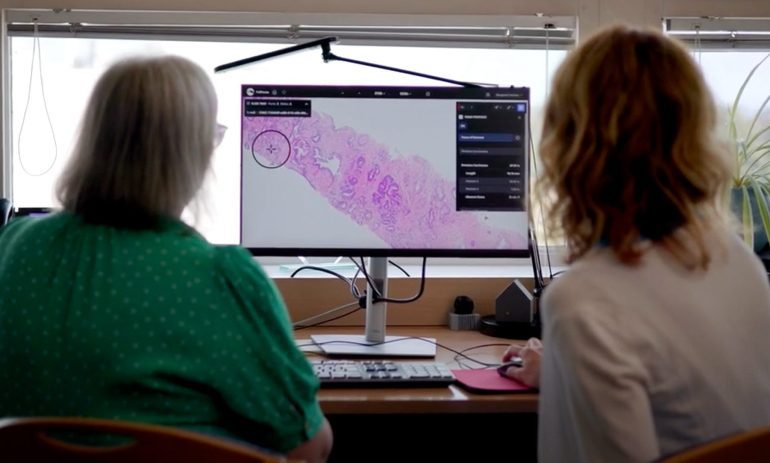- Three English hospitals begin a clinical trial of AI technology for prostate cancer detection and grading.
- The ARTICULATE PRO study is led by the University of Oxford in collaboration with Paige.
- Participating hospitals: North Bristol Trust Southmead Hospital, University Hospitals Coventry and Warwickshire, Oxford University NHS Foundation Trust.
- The AI system, Paige Prostate Suite, aids pathologists in detecting and assessing prostate tumors.
- Pathologists will evaluate the AI’s impact on clinical decisions, service delivery, and resource use.
- The trial includes hospitals with varied digital pathology equipment and patient demographics.
- Funded by the Accelerated Access Collaborative (AAC) and overseen by the Department of Health and Social Care.
- Potential for AI to improve early detection, grading accuracy, and patient outcomes in prostate cancer.
Main AI News:
Three hospital systems across England have launched a pivotal clinical trial to assess AI technology designed for detecting and grading prostate cancer. This initiative, termed ARTICULATE PRO, is spearheaded by the University of Oxford in collaboration with Paige, a leader in clinical AI solutions for cancer diagnosis.
The participating institutions—North Bristol Trust Southmead Hospital, University Hospitals Coventry and Warwickshire, and Oxford University NHS Foundation Trust—are integrating Paige’s AI technology into their routine care protocols. This multisite trial aims to explore the efficacy of AI in enhancing patient outcomes amid the increasing incidence of prostate cancer.
Professor Clare Verrill, a Cellular Pathology Consultant at OUH and Principal Investigator of ARTICULATE PRO, emphasized, “Our primary goal with ARTICULATE PRO is to optimize patient benefits through advanced AI technology. The use of The Paige Prostate Suite across multiple sites allows us to systematically evaluate its advantages in clinical practice.”
The Prostate Suite, the AI system under investigation, assists pathologists in identifying, grading, and measuring prostate tumors from biopsies and tissue samples. At the three hospitals, pathologists are examining how this AI system influences clinical decisions, pathology services, and resource management in practical settings.
Dr. Jon Oxley, Uropathologist and Bristol lead for ARTICULATE PRO, stated, “After over 25 years of research into prostate cancer, it’s a significant milestone to see Paige’s AI applications validated for live clinical use. Integrating the Paige Prostate Suite with our standard procedures promises to enhance efficiency and result consistency.”
The study stands out for its deployment across hospitals equipped with various digital pathology scanners and information systems, serving diverse patient demographics. This approach ensures a thorough evaluation of how Paige’s AI technology can benefit patients, histopathologists, and healthcare systems in prostate cancer detection.
Dr. Bidisa Sinha, Uropathologist at University Hospitals Coventry and Warwickshire, remarked, “We are confident that AI can refine cancer grading accuracy and detect small cancerous areas that might be overlooked. This cutting-edge research at UHCW positions us as a global leader in digital and computational pathology.”
Funded by the Accelerated Access Collaborative (AAC) Artificial Intelligence in Health and Care Award and overseen by the Department of Health and Social Care, the ARTICULATE PRO study aims to contribute to earlier detection, more precise grading, and improved outcomes for prostate cancer patients. The trial’s findings could pave the way for broader AI adoption in cancer diagnostics across the UK and globally.
Conclusion:
The initiation of the ARTICULATE PRO trial marks a significant step forward in the integration of AI technology within clinical oncology. By deploying AI across various hospital systems, this study aims to validate the technology’s effectiveness in enhancing diagnostic accuracy and efficiency. The findings could drive wider adoption of AI in cancer diagnostics, potentially transforming how prostate cancer is detected and managed. If successful, the trial could lead to earlier diagnosis and improved patient outcomes, setting a precedent for future AI applications in healthcare. This advancement holds promise for addressing the rising incidence of prostate cancer and improving the overall quality of patient care.

